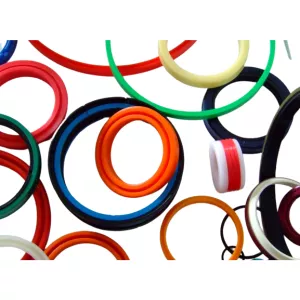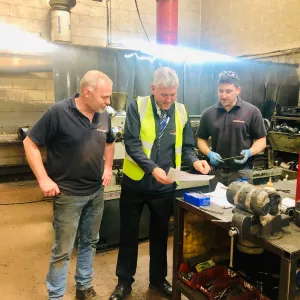How does a hydraulic cylinder work
Seals are essential to fluid power engineering, as they prevent a fluid or gas from passing between the different components of a hydraulic cylinder.
Dynamic (used when parts are in motion) or static (fixed application), different types of seals, each have their own role to play, in ensuring a cylinder runs as smoothly as possible.
Our quick guide below shows the main types of seals that you would find in a cylinder and describes how they operate.
Wiper Seals
Wiper seals or Scraper seals are designed in a way to keep external contaminants out of a hydraulic system, by cleaning the rod in the cylinder on each cycle.
Rod Seals
Also known as Gland seals, Headbush or Neck Seals, Rod seals act as a pressure barrier to maintain and regulate the operating fluid in a cylinder. They can seal the pressure from one side (single-acting) or from both sides (double-acting). Rod seals are key in preventing corrosion.
Static Seals
These are used to create a seal between fixed components. The full range of static seals include o-rings, back-up rings, flange seals, bonded washers and OP seals.
Piston Seals
Piston seals are important for controlling the motion of a cylinder. It creates a barrier for dynamic pressure between the piston and the cylinder, preventing fluid from passing the piston and allowing the cylinder to extend and retract.
Guide Rings
Guide rings also known as bearing rings, stop metal-to-metal contact between two dynamic cylinder components. This is crucial in the prevention of damage to the two moving surfaces.
The right seal for the job
When selecting the best seals for your hydraulic ram, both at OEM or repair stage, it’s important to consider the parameters of the application and the operating conditions.
High pressure, medium used, extreme temperatures, aggressive chemicals, working environment and legislation standards will all have an impact on the chosen material of seal.
Over time however, it is expected that hydraulic seals will eventually need replacing, this can be down to general wear and tear, improper installation or exposure to extreme elements.
Most replacement seals, for most applications can be found off the shelf and seal kits for well known applications can be picked up easily.
If you require any further advice regarding seals and their applications, the team of experts at FPE Seals can help you source what you need.
Can’t find what you’re looking for? We can also custom-manufacture a full range of seals, in a full range of materials to meet your exact requirements.
What to read next...
Sign up to our newsletter
Don't forget to subscribe to our newsletter to receive details of our latest special offers and new products.
Darlington
Telephone: +44 (0) 1325 282732 Email: sales@fpeseals.com
Doncaster
Telephone: +44 (0) 1302727252 Email: doncaster@fpeseals.com
Aberdeen
Telephone: +44 (0) 1224648999 Email: sales@swanseals.co.uk
The Netherlands
Telephone: +31 (0) 162581060 Email: info@fpeseals.com



